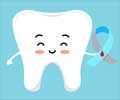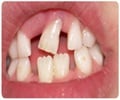Researchers from the US and Australia have claimed that they can now use fossil teeth to calculate when a Neanderthal baby was weaned.

Using the new technique, the researchers concluded that at least one Neanderthal baby was weaned at much the same age as most modern humans.
Just as tree rings record the environment in which a tree grew, traces of barium in the layers of a primate tooth can tell the story of when an infant was exclusively milk-fed, when supplemental food started, and at what age it was weaned, Katie Hinde, professor of human evolutionary biology at Harvard University and an affiliate scientist at the UC Davis Primate Center, said.
Hinde directs the Comparative Lactation Laboratory at Harvard and has conducted a three-year study of lactation, weaning and behavior among rhesus macaques at UC Davis.
The team was able to determine exact timing of birth, when the infant was fed exclusively on mother's milk, and the weaning process, from mineral traces in teeth.
By studying monkey teeth and comparing them to center records, they could show that the technique was accurate almost to the day.
They found that the Neanderthal baby was fed exclusively on mother's milk for seven months, followed by seven months of supplementation - a similar pattern to present-day humans.
Although there is some variation among human cultures, the accelerated transition to foods other than mother's milk is thought to have emerged in our ancestral history due, in part, to more cooperative infant care and access to a more nutritious diet, Hinde said.
Shorter lactation periods could mean shorter gaps between pregnancies and a higher rate of reproduction.
However, there has been much debate about when our ancestors evolved accelerated weaning.
For the past few decades researchers have relied on tooth eruption age as a direct proxy for weaning age.
Yet recent investigations of wild chimpanzees have shown that the first molar eruption occurs toward the end of weaning.
"By applying these new techniques to primate teeth in museum collections, we can more precisely assess maternal investment across individuals within species, as well as life history evolution among species," Hinde said.
The study is published in the journal Nature.
Source-ANI
 MEDINDIA
MEDINDIA


 Email
Email








